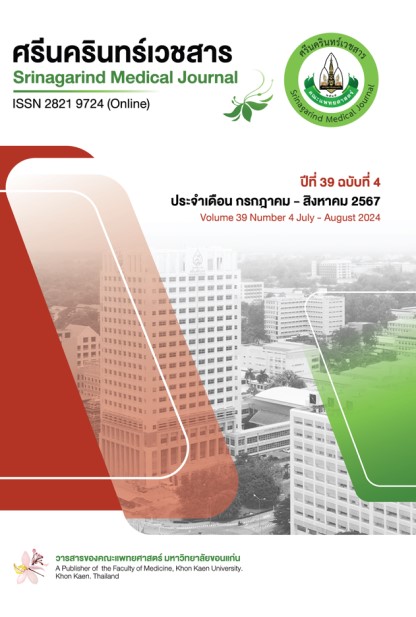Maternal Anxiety Before Amniocentesis and Clinical Outcomes for Prenatal Diagnosis of Down Syndrome in Loeng Nok Tha Crown Prince Hospital, Yasothon Province, Thailand
Keywords:
Down syndrome, amniocentesis, high risk pregnancy, quadruple testAbstract
Objective: The purpose of the current study was to assess the maternal anxiety before amniocentesis and clinical outcomes for prenatal diagnosis of Down syndrome in Loeng Nok Tha Crown Prince Hospital, Yasothon province in Thailand.
Materials and methods: This was a cross-sectional study, during the period of January 2019 to December 2023. Sample group were 93 pregnant women, divided into 52 cases of positive Q-Test screening (PQT) and 41 cases of the age over 35 years or more (advanced maternal age: AMA).
Results: 60.22 % of pregnant women were high levels of anxiety about amniocentesis, 68.82% (64 people) accepted for amniocentesis, and mostly were performed at 16-18 weeks (70.97 %). The chromosome test results were abnormal in 6 people (9.38%).
Conclusions: The goal for doctors is to ensure an enable pregnant women and their families to be able to make their own decisions with confidence, as this would help to reduce the fear and anxiety level, and consequently it will help them to accept and acknowledge the procedurals outcomes and reduce anxiety among pregnant women waiting to undergo an amniocentesis.
References
Hanprasertpong T. Prenatal Diagnostic Procedures. Songkla Med J 2010;28(6):339-48.
Department of health thailand. Genetics counseling course for down syndrome. Nonthaburi: Office of the veterans affairs printing organization; 2020.
Dimri N, Baijal A. Amniocentesis. J Fetal Med 2016;3:131-5. doi:10.1007/s40556-016-0084-0
Cunningham FG, Leveno KJ, Bloom SL. Prenatal diagnosis and fetal therapy. Williams Obstetrics. editor. New York: McGraw-Hill; 2005.
Rodeck CH, Whittle MJ. Fetal medicine: basic science and clinical practice. London: Harcourt Brace and Company Ltd; 1999.
Kessler S. Psychological aspects of genetic counseling. IX. Teaching and counseling. J Genet Couns 1997;6:287-95. doi:10.1023/A:1025676205440.
Sanukul P. Quadruple Marker Test. Journal of Regional Health Promotion Centre 7 KhonKaen 2017;10(1):1-11.
Spielberger CD, Gonzalez-Reigosa F, Martinez-Urrutia A, Natalicio LF, Natalicio DS. The state-trait anxiety inventory. Interam J Psychol 1971;5(3 & 4). 145-58. doi:10.30849/rip/ijp.v5i3%20&%204.620
Kunsiripunyo J, Srirot W. Preparation of counseling nurses to support down syndrome screening system in all age groups of pregnant women. J Phrapokklao Nurs College 2021;31(1):237-52.
Siriwipat A. Outcome of down syndrome screening using quadruple test at Phatthalung Hospital. Reg11Med 2022;37(2):34-46.
Warasatit C, Intarasukum P, Karnjanasing A. Genetic amniocentesis at Chachoengsao Hospital. J Health Sci 2008;17(Suppl V):1385-91.
Bombard AT, Powers JF, Carter S, Schwartz A, Nitowsky HM. Procedure-related fetal losses in transplacental versus nontransplacental genetic amniocentesis. Am J Obstet Gynecol 1995;172(3):868-72. doi:10.1016/0002-9378(95)90013-6.13.
Seeds JW. Diagnostic mid trimester amniocentesis: how safe?. Am J Obstet Gynecol 2004;191(2):607-15. doi:10.1016/j.ajog.2004.05.078
Tabor A, Madsen M, Obel E, Philip J, Bang J, Gaard-Pedersen B. Randomised controlled trial of genetic amniocentesis in 4606 low-risk women. The Lancet 1986;327(8493):1287-93. doi:10.1016/s0140-6736(86)91218-3.
Antsaklis A, Papantoniou N, Xygakis A, Mesogitis S, Tzortzis E, Michalas S. Genetic amniocentesis in women 20–34 years old: associated risks. Prenat Diagn.2000;20(3):247-50. doi: 10.1002/(SICI)1097-0223(200003)20:3<247::AID-PD794>3.0.CO;2-O.
Marthin T, Liedgren S, Hammar M. Transplacental needle passage and other risk‐factors associated with second trimester amniocentesis. Acta Obstet Gynecol Scand 1997;76(8):728-32. doi:10.3109/00016349709024337.
Kappel B, Nielsen J, Hansen KB, Mikkelsen M, Therkelsen AJ. Spontaneous abortion following mid‐trimester amniocentesis. Clinical significance of placental perforation and blood‐stained amniotic fluid. Br J Obstet Gynaecol 1987;94(1):50-4. doi:10.1111/j.1471-0528.1987.tb02252.x
Kong CW, Leung TN, Leung TY, Chan LW, Sahota DS, Fung TY, et al. Risk factors for procedure‐related fetal losses after mid‐trimester genetic amniocentesis. Prenat Diagn 2006;26(10):925-30. doi:10.1002/pd.1528.
Harper LM, Cahill AG, Smith K, Macones GA, Odibo AO. Effect of maternal obesity on the risk of fetal loss after amniocentesis and chorionic villus sampling. Obstet Gynecol 2012;119(4):745-51. doi:10.1097/AOG.0b013e318248f90f
Downloads
Published
How to Cite
Issue
Section
License
Copyright (c) 2024 Srinagarind Medical Journal

This work is licensed under a Creative Commons Attribution-NonCommercial-NoDerivatives 4.0 International License.




